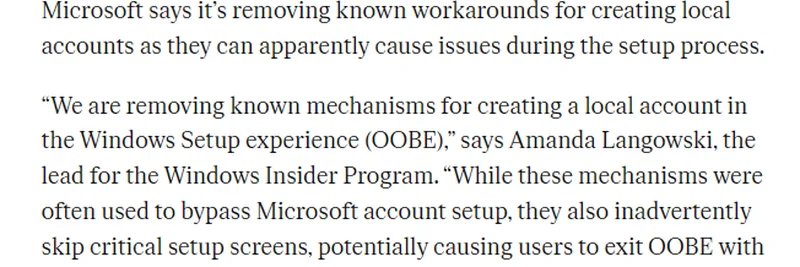In the ever-evolving world of tech, a recent tweet from developer and content creator @ThePrimeagen has ignited discussions about privacy and corporate control. Quoting a post from Casey Muratori, ThePrimeagen calls out Microsoft's latest move in Windows 11 setup, where the company is cracking down on ways to create local accounts without linking to a Microsoft account.
For those not deep into operating systems, a local account is basically a user profile on your computer that doesn't require signing in with an online service like a Microsoft account. It keeps things offline and private. Microsoft argues that these bypass methods can cause issues during setup, but critics like Muratori and ThePrimeagen see it as a thinly veiled attempt to force users into their ecosystem for better tracking and ad targeting.
ThePrimeagen puts it bluntly in his tweet: "we think you are too stupid to use local accounts" translates to pushing for more data collection under the guise of user safety. He points out the irony— instead of fixing the broken setup experience, Microsoft opts to remove the option altogether.
This isn't just a Windows gripe; it's a broader commentary on centralization in tech. Big companies like Microsoft control vast amounts of user data, often prioritizing business interests over privacy. Enter blockchain and meme tokens, where decentralization flips the script.
Why Blockchain Offers a Better Path
Blockchain technology, the backbone of cryptocurrencies and meme tokens, operates on decentralized networks. Unlike Microsoft's centralized servers that track your every move, blockchains like Ethereum or Solana distribute control across thousands of nodes. This means no single entity can force you into data-sharing schemes.
For meme token enthusiasts—think Dogecoin, Shiba Inu, or emerging projects like PEPE—community governance is key. These tokens often start as jokes but evolve into ecosystems where users vote on decisions without a corporate overlord dictating terms. It's a stark contrast to Microsoft's approach, where users are nudged (or shoved) toward accounts that enable ads and surveillance.
Privacy Tools in the Crypto Space
If Microsoft's moves have you worried about privacy, blockchain has solutions. Privacy-focused chains like Monero or Zcash use advanced cryptography to shield transactions. Even in meme token worlds, tools like zero-knowledge proofs are gaining traction, allowing you to prove ownership without revealing personal info.
Projects in the meme token space are increasingly incorporating privacy features. For instance, some DeFi platforms built around meme coins offer anonymous swapping, helping users avoid the kind of tracking Microsoft seems keen on.
What This Means for Tech Users and Crypto Practitioners
The debate sparked by this tweet highlights a growing tension: convenience versus control. While Microsoft claims it's for a smoother experience, the reality is more about data monetization. For blockchain practitioners, it's a reminder of why decentralization matters—empowering users rather than treating them as data mines.
If you're into meme tokens, this could inspire new projects poking fun at big tech's overreach. Imagine a "LocalAccountCoin" meme token that rewards users for privacy-preserving actions. It's the kind of satirical innovation that thrives in crypto communities.
As tech giants tighten their grip, turning to blockchain isn't just smart; it's essential for maintaining autonomy. Keep an eye on discussions like this—they're signals of where the industry is heading.
Stay tuned to Meme Insider for more insights on how tech news intersects with blockchain and meme tokens.



